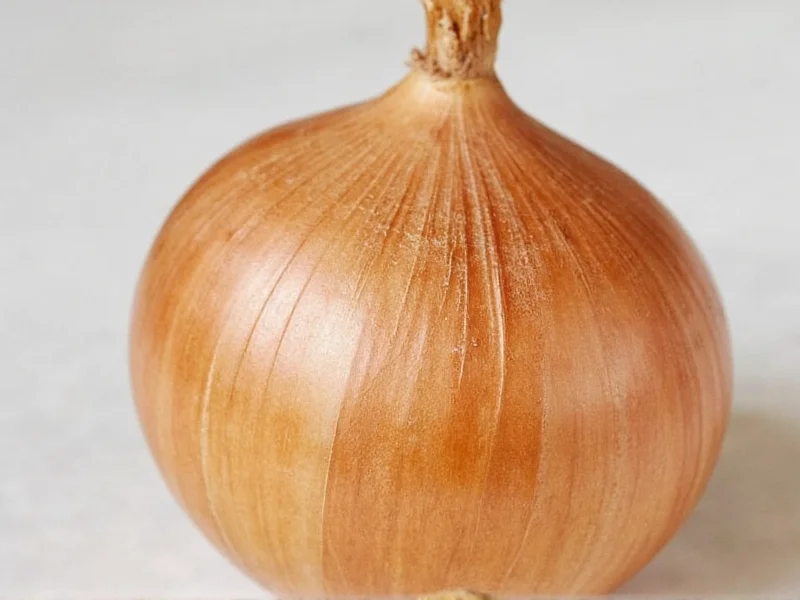When substituting onion powder for fresh onions in your cooking, understanding the precise conversion ratio is essential for maintaining flavor balance. The universally accepted culinary standard states that 1 tablespoon of onion powder equals one medium fresh onion. This measurement provides the equivalent onion flavor without the moisture content of fresh onions.
Understanding the Onion Powder Conversion Ratio
The 1:1 conversion ratio (1 tablespoon powder = 1 medium onion) works because dehydrated onion powder concentrates the flavor while removing water. Fresh onions are approximately 89% water, so when dehydrated and ground into powder, their flavor compounds become more concentrated.
For precise measurements, consider these details:
| Fresh Onion Size | Onion Powder Equivalent | Teaspoon Measurement |
|---|---|---|
| Small (½ cup chopped) | 2¼ teaspoons | 2¼ tsp |
| Medium (1 cup chopped) | 1 tablespoon | 3 tsp |
| Large (1½ cups chopped) | 1½ tablespoons | 4½ tsp |
| Jumbo (2 cups chopped) | 2 tablespoons | 6 tsp |
Factors Affecting Your Onion Powder Conversion
While the standard conversion works for most applications, several factors might require slight adjustments to your onion powder to fresh onion ratio:
- Recipe moisture content - In dry recipes like spice rubs, use the standard ratio. For moist dishes like soups, reduce powder by ¼ teaspoon to prevent overpowering flavor
- Onion variety - Sweet onions (Vidalia, Walla Walla) have milder flavor, so you might use 10-15% less powder than the standard conversion
- Recipe cooking time - Long-simmered dishes may require slightly more powder as flavor dissipates over time
- Personal taste preferences - Some palates detect onion powder more intensely than fresh onion
When to Use Onion Powder Instead of Fresh Onions
Understanding how to substitute onion powder for fresh onion becomes particularly valuable in specific cooking scenarios:
- Dry spice blends and rubs - Onion powder integrates seamlessly without adding moisture that could spoil the mixture
- Quick breads and baked goods - Prevents pockets of raw onion flavor while providing consistent seasoning
- Emergency substitutions - When you've run out of fresh onions but need to complete your recipe
- Time-constrained cooking - Eliminates chopping time while delivering immediate flavor infusion
- Texture-sensitive dishes - Ideal for sauces and dressings where onion pieces would be undesirable
Pro Tips for Perfect Onion Powder Substitution
Mastering the fresh onion to onion powder conversion requires more than just measurement knowledge. Consider these professional techniques:
- Bloom the powder - Mix onion powder with 1-2 teaspoons of warm water or broth before adding to recipes for more authentic flavor release
- Adjust seasoning timing - Add onion powder early in cooking for soups/stews, but later for quick sautés to prevent bitterness
- Combine with other alliums - For complex flavor, use 2 parts onion powder to 1 part garlic powder in savory dishes
- Store properly - Keep onion powder in an airtight container away from light to maintain potency for up to 2 years
- Taste as you go - Since potency varies by brand, add ¾ of the recommended amount first, then adjust
Common Mistakes to Avoid with Onion Powder
Many home cooks make these errors when attempting how much onion powder for one onion substitutions:
- Using equal volume measurements - 1 cup fresh onion does NOT equal 1 cup onion powder (it would be overpowering)
- Not accounting for salt content - Many commercial onion powders contain anti-caking agents with salt, so reduce added salt in recipes
- Adding directly to hot oil - Can cause burning; always mix with other dry ingredients first
- Expecting identical texture - Onion powder provides flavor but not the textural element of fresh onions
- Using expired powder - Old onion powder loses potency; check for strong aroma before using
Special Considerations for Different Cuisines
The ideal onion powder measurement equivalent varies slightly across culinary traditions:
- Mexican cuisine - Use 10% less powder than standard conversion for salsas and moles to maintain bright flavor
- Indian curries - Increase powder by ¼ teaspoon when substituting for onions in long-cooked dishes
- French sauces - For delicate sauces like béchamel, use only 2 teaspoons powder per medium onion equivalent
- American BBQ rubs - Use full conversion ratio as the robust flavors can handle concentrated onion flavor











 浙公网安备
33010002000092号
浙公网安备
33010002000092号 浙B2-20120091-4
浙B2-20120091-4